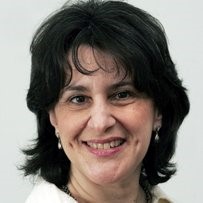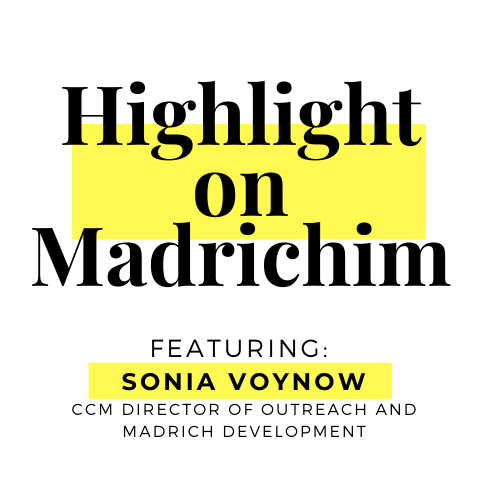Sonia Voynow was raised in a conservative Jewish home. Though she was bat mitzvahed and enjoyed the holidays with her family, she didn’t find “much in the way of spiritual connection.”
It wasn’t until she started her own family that she began a deeper exploration of Judaism. Sonia said, “I have two kids, my younger child has autism. In my struggles to deal with family dynamics, my friend Beulah Trey recommended Mussar.”
Sonia began studying Mussar with Rabbi Ira Stone in the Fall of 2005. She continues to study in va’ads and to teach Mussar, and is now CCM’s Director of Outreach and Madrich Development.
“Mussar brought me home to Judaism,” she continued, and was a “real turning point in my relationship with Judaism. It helped me immeasurably to be more grounded as a parent, practice self care, to have a stronger relationship with my husband. Judaism has all these tools; it is a religion that is so alive and offers so much.”
Sonia emphasizes going back to the basics, “If you’re not taking sufficient care of yourself, you’ll never really be able to take care of the other person. The toolbox of Mussar offers Seder or Order as one of the first character traits. The definition of Order is to let your mind be free to attend to what is right in front of you–that is mindfulness. For example, if my daughter wants to take a walk, I can recognize the preciousness of that, put everything aside, and go for the walk. These days, we’re all back to basics, spending time with our families, cooking; if we can have our minds right there, it can be a blessing and a reminder to slow down.”
Mussar tools are essential for spiritual life, perhaps more now than ever. Sonia reflected on the importance of the “sweet spot” of self care, finding ways to be “really available to the other person in our lives. Not distracted, but present…this is the self care that Mussar teaches us; to practice to be in that zone. Every one of the character traits can be used for self care.”
Sonia chose to study and teach with CCM because she found “real integrity” in the way Mussar is taught.
“It’s very clear when you start studying with CCM,” she said, “the gold standard is how the others in your life feel around you; how you are attending to them. You can say, ‘I’m doing great! I love myself!’ But if the people around you are miserable, you’re not really doing it.”
She’s been deeply inspired by Rabbi Stone’s approach to text study, in which he often draws upon the similarity between text study and reading poetry. Sonia said, “I’ve learned so much about studying text which connects with the Jewish practice of learning with voices who predate us by hundreds of years.” While reading, she holds a question in mind, “what does this person have to teach me?” and proceeds ever deeper through her inquiry.
Text study combined with the companionship of her Va’ad, has allowed her to utilize the character traits in everyday life, strengthen her relationships, and deepen her connection to Judaism and the teachers who have come before.
When asked to imagine what the world could be like if everyone approached life as a Mussarnik, she paused, “People would have the tools to feel more connected and less afraid of one another.”


